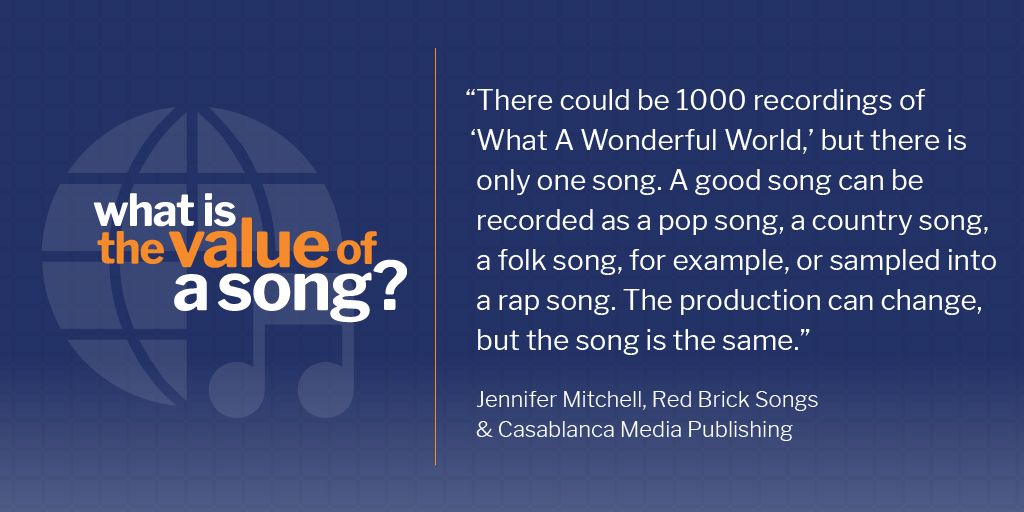par Jon Dekel
When Jennifer Mitchell first heard “What a Wonderful World,” she could never have imagined that one day she would be working to represent the timeless anthem (that was written in 1968 by Bob Thiele and George David Weiss and recorded by Louis Armstrong), alongside other classics like “My Way,” “YMCA,” and the songs made popular by artists such as John Lennon, the Rolling Stones, Joan Jett, Steve Miller, and Bill Withers.

& Red Brick Songs
President Jennifer Mitchell
(credit Hayley Andoff Photography)
Yet, as the President of Red Brick Songs and Casablanca Media Publishing, Mitchell not only works with legendary catalogues – ABKCO, Fairwood, Budde, Because, Bucks, Fox (now owned by Disney), Carlin, Big Yellow Dog, Little Kim, the estate of Roy Orbison, Spandau Ballet, Cadence Music, Glass Tiger, Spirit Music Horizons, Springtime Music (Aretha Franklin), Scorpio Publishing (the Village People) and most recently 2 Unlimited, she and her seven-person team have signed and developed a worldwide roster of nearly 50 songwriters, among them The Rural Alberta Advantage, the Fast Romantics, Jeen O’Brien, Dan Davidson, Charlotte Cardin, The Great Lake Swimmers, Zanki, Swim Good Now, Russell Broom and Aidan Knight.
This enviable repertoire allows Mitchell, as the head of one of Canada’s leading independent publishers, the agility to remain grounded in discovering and championing emerging Canadian talent. “It’s tremendously rewarding to help up-and-coming songwriters establish their craft and their careers,” she says, referring to the process as a perpetual career highlight. “Being at the forefront of that creativity is incredibly fulfilling.”
It’s a considerably different career path from the one Mitchell originally set out on. Growing up in Timmins, Ontario, she developed a love of music from her parents, who spent their lives outside of work either playing in orchestras or jazz bands. And while she fondly recalls duetting with her mother on Mills/Hudson/DeLange’s “Moonglow,” “I took a different road,” she explains. “After business school, I went to law school with the intent of practicing commercial law with a special interest in tax.”
Graduating from the University of Windsor, Mitchell took a job at Farano Green, a boutique Toronto firm specializing in tax, entertainment, and real estate law. It was there that she met her future business partner, the entertainment lawyer and music industry veteran, Edmund Glinert, whose clients included Ray Charles, Muddy Waters and David Letterman.

“I got pulled into entertainment law by chance and that took me down a very different path than the one I had originally planned for myself,” she says.” It wasn’t long before I consciously made the decision to give up private practice to start a media company with Ed.”
The pair started Casablanca Media in 2001, “from there, I never looked back.” Using their business and legal acumen, Mitchell and Glinert quickly grew Casablanca from a home for the latter’s various record labels into an industry powerhouse.
By the end of the decade, Casablanca was representing over 400,000 domestic and international copyrights. However, just a short year later, tragedy struck when Gilbert suffered a sudden and lethal stroke, leaving Mitchell without a business partner, mentor and friend. Ever the entrepreneur, and in respect to her former partner’s legacy, she created Red Brick Songs shortly thereafter to focus on new signings and business development. “Publishing is a relationship business and a service business,” she says of what she learned from her time with Glinert. “You have to have great relationships but also provide value added to the songwriters and publishers you work with.”
Today, Mitchell presides over both Casablanca and Red Brick Songs, earning accolades including Music Publisher of the Year at the SOCAN awards in 2019. She also sits on the SOCAN Board (Vice Chair), the Music Publishers Canada board (Vice Chair), as well as the Independent Music Publishers Forum board, while continuing to grow the company’s worldwide roster and expand its reach.
Looking back on nearly twenty years as a music publisher, Mitchell says the key to her success has been to understand that “a publisher is a champion of the songwriter.” “We provide creative opportunities, connections, financial support, moral support, and manage their lives as songwriters,” she explains. “Often we are a creative sounding board and their greatest cheerleader. We spend our time tracking down money owed, administering royalties, championing the publishing industry and fighting for songwriter royalties, enforcing copyright, providing A&R support, pitching songs for use in film, television, commercials, games and other uses, as well as cover recordings by other artists, setting up co-writes and many other activities that enhance the lives of our songwriters and publisher clients.”
Her hands-on approach means she and her team are responsible for “everything from advances, to late night texts, to creative opportunities, connections, co-writes and being active in the industry.”
Beyond that, Mitchell has seen the market for legacy catalogue open up with exciting opportunities, such as hologram tours. “The Roy Orbison estate worked very hard to create a hologram tour which was a unique opportunity for new fans to get a sense of Roy Orbison as a performer,” she says. “[To succeed with a legacy catalogue] you really have to look at this at the song level: how do you best promote that song? What are the wishes of the estate heirs or the management of a contemporary artist? Each one comes with their own wish list and sometimes restrictions on marketing. There is no hard and fast rule. You find ways to shine a light on the songs that you work with: Is there a licensing history that helps you promote that song? Is it a hidden gem? Is the estate or management team doing other things to promote the songs that are unique or provide you with an opportunity to have potential licensees connect with the music?”
But while the opportunities for publishing expand, Mitchell says she’s been frustrated at the industry’s inability to keep up with the ever-evolving digital landscape. “We are still lagging behind technology and are in catch up mode,” she explains. “New platforms that depend on music are launched every day, and most attempt to run their businesses without securing the proper licenses and paying songwriters for the use of their music; essentially they are expecting the creative industry and songwriters to subsidize their new business. The excuse is always the same – disruption means they have to move fast. It’s an old story now. Songwriters deserve to be paid – not 5 years after a new platform has launched – but the appropriate amount and from the beginning.”
“The music publishing industry is an important economic driver in most countries, providing jobs and economic growth, and the industry has worked hard to get licensing deals in place, but there is still a lot of work to do,” she continues. “There is still a lot of pressure on songwriters to give away their work for free and this has to stop. No one else is being asked to do this – not the lawyers drafting paperwork or the companies supplying IT services.”
That being said, Mitchell believes “music publishing is a growth industry and it will continue to expand and grow with technology. It’s amazing how many new platforms and media heavily rely on music. Silence never sold anything.”
To that end, Mitchell says she only has to think back to the wonder of hearing “What a Wonderful World” for the first time. “The saying goes that it all starts with a song and that is absolutely true,” she says of a song’s value. “There could be 1000 recordings of “What A Wonderful World,” but there is only one song. That is why the value of songs in 2020 remains very high. A good song can be recorded as a pop song, a country song, a folk song, for example, or sampled into a rap song. The production can change, but the song is the same.
“If it’s a good song, it stands the test of time. It outlives the recordings,” she adds. “It enters the consciousness of the population and it’s recorded again and again. Something about a great song speaks to the soul and it’s hard to put a maximum value on that.”
Thinking about becoming a client of CMRRA? Already a client but you have questions? Email us at [email protected] and we’ll get you the answers you need.


